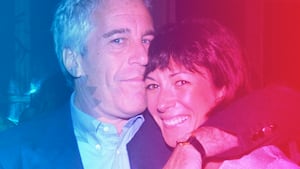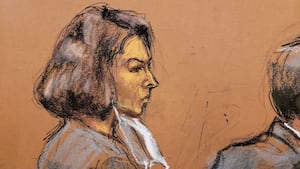A Manhattan federal judge has denied Ghislaine Maxwell’s request for a retrial over a juror’s failure to disclose a history of sexual abuse during jury selection.
On Friday, Judge Alison Nathan issued an opinion and order that put to rest months of speculation about the future of Maxwell’s guilty verdict.
In late December, a jury convicted Maxwell of grooming and trafficking underage girls for perverted financier Jeffrey Epstein’s sex ring. Days later, Maxwell’s attorneys requested a new trial because a juror referred to as Scotty David had given a flurry of media interviews which revealed he was a survivor of childhood sexual abuse but hadn’t disclosed the experience during jury selection. Scotty also told reporters that he used his experience to help sway fellow jurors who were skeptical of certain victims’ testimony.
Maxwell’s camp argues that Scotty, officially known as Juror 50, never would have made it to the panel had he filled out his juror questionnaire truthfully. (During a hearing last month, Scotty testified under oath that he didn’t intend to lie on the form; he said he “flew through” the questions because he was distracted by noise in the jury selection room.)
In her ruling, Nathan said Scotty “testified credibly at the hearing.”
“Juror 50’s lack of attention and care in responding accurately to every question on the questionnaire is regrettable, but the Court is confident that the failure to disclose was not deliberate,” Nathan wrote in the filing.
The judge also stated that Scotty “was not biased” and “would not have been stricken” from the jury pool even if he had answered questions truthfully; the questions he failed to answer accurately include whether he experienced sexual abuse, assault, or harassment, whether a friend or family member was accused of such sexual misconduct, and whether he’d ever been the victim of any crime at all.
“Juror 50’s responses at the hearing to the questions regarding his ability to be a fair and impartial juror, even in light of his past experience of sexual abuse, established that he too could serve fairly and impartially,” Nathan added. “Thus, this Court would not have struck Juror 50 for cause if he had provided accurate responses to the questionnaire.”
Nathan ruled Juror 50’s testimony addressing why he rushed through the jury form is credible. “He testified that his attention to the questionnaire was distracted by several factors, among them the several hours that he had to wait in the courthouse’s security line, to wait in the room to hear the Court’s instructional video, and then to begin answering questions. And while he waited, he says, he was distracted by his thoughts on the recent end of a romantic relationship,” Nathan wrote.
“This explanation coheres with Juror 50’s testimony that his sexual abuse history was not a salient or front-of-mind consideration as he completed the questionnaire,” Nathan added. “He repeatedly testified that he does not often think about his sexual abuse.”
Nathan noted that eight prospective jurors indicated they had been sexually assaulted, abused, or harassed on the questionnaire and proceeded to the voir dire portion of jury selection. Maxwell, Nathan said, “did not challenge any of these prospective jurors for cause on the basis of the juror’s answer” to this question.
“To imply or infer that Juror 50 was biased—simply because he was himself a victim of sexual abuse in a trial related to sexual abuse and sex trafficking, and despite his own credible testimony under the penalty of perjury, establishing that he could be an even-handed and impartial juror—would be tantamount to concluding that an individual with a history of sexual abuse can never serve as a fair and impartial juror in such a trial,” Nathan wrote. “That is not the law, nor should it be.”
Before Nathan’s ruling, Maxwell’s lawyer Bobbi Sternheim wrote to the court, asking her to delay her ruling on whether the British socialite will be granted a new criminal trial because of a pending TV interview with Juror 50.
According to Sternheim’s letter, Paramount Plus will air an interview with the juror as part of its series Ghislaine: Partner in Crime. “The trailer announces a ‘bombshell revelation’ from Juror 50 in his ‘only in-depth interview,’” Sternheim wrote.
“We have been unable to access the series in order to review the content of Juror’s 50 statements nor have we learned whether the interview was recorded before he testified at [a previous] hearing,” Sternheim continued. “The series was scheduled to air on March 29, but we have learned that Paramount is holding off airing the series pending the Court’s ruling concerning Juror 50.”
“We bring to the Court’s attention this previously undisclosed interview and request a stay of any ruling pending review of the interview by the Court and counsel.”
Less than shockingly, prosecutors opposed the request for a stay.
“Indeed, the defendant’s application contains no legal or factual support beyond the citation to a Paramount Plus trailer,” assistant U.S. Attorneys Maurene Comey, Alison Moe, Lara Pomerantz, and Andrew Rohrbach wrote.
“If the defendant obtains new information, she may file any appropriate motions at that time, but it is inappropriate to stay this matter based on nothing more than the defendant’s conjecture.”







